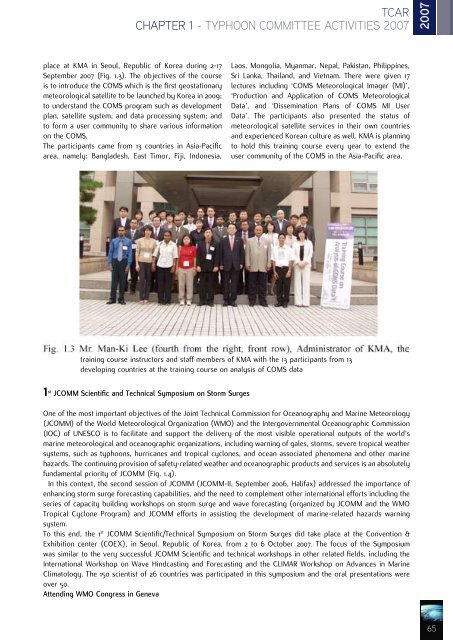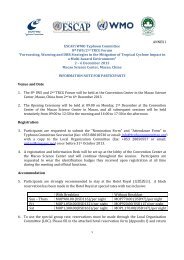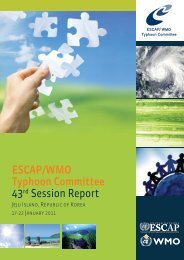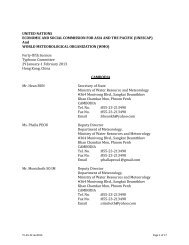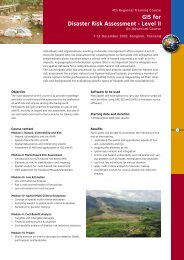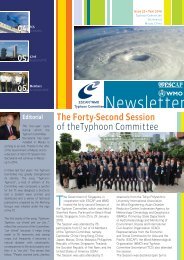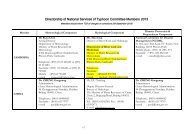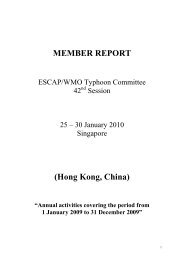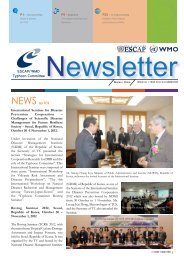200 - Typhoon Committee
200 - Typhoon Committee
200 - Typhoon Committee
Create successful ePaper yourself
Turn your PDF publications into a flip-book with our unique Google optimized e-Paper software.
TCAR<br />
CHAPTER 1 - TYPHOON COMMITTEE ACTIVITIES <strong>200</strong>7<br />
<strong>200</strong>7<br />
place at KMA in Seoul, Republic of Korea during 2-17<br />
September <strong>200</strong>7 (Fig. 1.3). The objectives of the course<br />
is to introduce the COMS which is the first geostationary<br />
meteorological satellite to be launched by Korea in <strong>200</strong>9;<br />
to understand the COMS program such as development<br />
plan, satellite system, and data processing system; and<br />
to form a user community to share various information<br />
on the COMS.<br />
The participants came from 13 countries in Asia-Pacific<br />
area, namely: Bangladesh, East Timor, Fiji, Indonesia,<br />
Laos, Mongolia, Myanmar, Nepal, Pakistan, Philippines,<br />
Sri Lanka, Thailand, and Vietnam. There were given 17<br />
lectures including ‘COMS Meteorological Imager (MI)’,<br />
‘Production and Application of COMS Meteorological<br />
Data’, and ‘Dissemination Plans of COMS MI User<br />
Data’. The participants also presented the status of<br />
meteorological satellite services in their own countries<br />
and experienced Korean culture as well. KMA is planning<br />
to hold this training course every year to extend the<br />
user community of the COMS in the Asia-Pacific area.<br />
training course instructors and staff members of KMA with the 13 participants from 13<br />
developing countries at the training course on analysis of COMS data<br />
!<br />
1 st JCOMM Scientific and Technical Symposium on Storm Surges<br />
One of the most important objectives of the Joint Technical Commission for Oceanography and Marine Meteorology<br />
(JCOMM) of the World Meteorological Organization (WMO) and the Intergovernmental Oceanographic Commission<br />
(IOC) of UNESCO is to facilitate and support the delivery of the most visible operational outputs of the world’s<br />
marine meteorological and oceanographic organizations, including warning of gales, storms, severe tropical weather<br />
systems, such as typhoons, hurricanes and tropical cyclones, and ocean associated phenomena and other marine<br />
hazards. The continuing provision of safety-related weather and oceanographic products and services is an absolutely<br />
fundamental priority of JCOMM (Fig. 1.4).<br />
In this context, the second session of JCOMM (JCOMM-II, September <strong>200</strong>6, Halifax) addressed the importance of<br />
enhancing storm surge forecasting capabilities, and the need to complement other international efforts including the<br />
series of capacity building workshops on storm surge and wave forecasting (organized by JCOMM and the WMO<br />
Tropical Cyclone Program) and JCOMM efforts in assisting the development of marine-related hazards warning<br />
system.<br />
To this end, the 1 st JCOMM Scientific/Technical Symposium on Storm Surges did take place at the Convention &<br />
Exhibition center (COEX), in Seoul. Republic of Korea, from 2 to 6 October <strong>200</strong>7. The focus of the Symposium<br />
was similar to the very successful JCOMM Scientific and technical workshops in other related fields, including the<br />
International Workshop on Wave Hindcasting and Forecasting and the CLIMAR Workshop on Advances in Marine<br />
Climatology. The 150 scientist of 26 countries was participated in this symposium and the oral presentations were<br />
over 50.<br />
Attending WMO Congress in Geneva<br />
65


